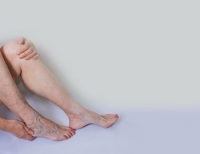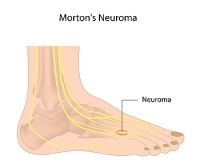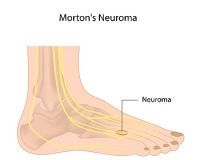
Blog (822)
Symptoms of Morton’s Neuroma
If you experience pain and discomfort between the third and fourth toes, you may have a condition that is referred to as Morton’s neuroma. The pain originates from tissue that has been affected as a result of a swollen nerve on the bottom of the foot. Research has shown that being involved in specific sports or wearing high heels may play a significant role in the development of this uncomfortable condition. Patients often notice a burning sensation in the ball of the foot. This may intensify as weight is put on the foot, in addition to a numbness or tingling feeling. Relief may be obtained by wearing correct footwear or gently massaging the affected area. If you feel you may have Morton’s neuroma, it’s advised to seek the counsel of a podiatrist who can properly inform you of correct treatment techniques.
Morton’s neuroma is a very uncomfortable condition to live with. If you think you have Morton’s neuroma, contact Dr. Kenneth Donovan of Advanced Care Foot and Ankle. Our doctor will attend to all of your foot care needs and answer any of your related questions.
Morton’s Neuroma
Morton's neuroma is a painful foot condition that commonly affects the areas between the second and third or third and fourth toe, although other areas of the foot are also susceptible. Morton’s neuroma is caused by an inflamed nerve in the foot that is being squeezed and aggravated by surrounding bones.
What Increases the Chances of Having Morton’s Neuroma?
- Ill-fitting high heels or shoes that add pressure to the toe or foot
- Jogging, running or any sport that involves constant impact to the foot
- Flat feet, bunions, and any other foot deformities
Morton’s neuroma is a very treatable condition. Orthotics and shoe inserts can often be used to alleviate the pain on the forefront of the feet. In more severe cases, corticosteroids can also be prescribed. In order to figure out the best treatment for your neuroma, it’s recommended to seek the care of a podiatrist who can diagnose your condition and provide different treatment options.
If you have any questions, please feel free to contact one of our offices located in Warren, Livingston, and Toms River, NJ . We offer the newest diagnostic and treatment technologies for all your foot care needs.
Causes of Gout
The common medical condition that is referred to as gout will typically cause severe pain and discomfort on the side of the big toe, in addition to swelling in the foot and ankle. It may develop as a result of excess uric acid in the blood levels, and this is generally the result of overindulging in alcohol, ingesting large amounts of red meat or shellfish, or taking certain medications, which may include diuretics. This ailment is caused by crystals that form in the joints of the big toe, and may gradually expand to additional joints. A blood test is generally performed, which can confirm this condition, in addition to having ultrasounds and CT scans taken which may provide additional affirmation. If you are experiencing the symptoms of gout, it is advised to speak with a podiatrist so proper treatment techniques can commence.
Gout is a foot condition that requires certain treatment and care. If you are seeking treatment, contact Dr. Kenneth Donovan from Advanced Care Foot and Ankle. Our doctor will treat your foot and ankle needs.
What Is Gout?
Gout is a type of arthritis caused by a buildup of uric acid in the bloodstream. It often develops in the foot, especially the big toe area, although it can manifest in other parts of the body as well. Gout can make walking and standing very painful and is especially common in diabetics and the obese.
People typically get gout because of a poor diet. Genetic predisposition is also a factor. The children of parents who have had gout frequently have a chance of developing it themselves.
Gout can easily be identified by redness and inflammation of the big toe and the surrounding areas of the foot. Other symptoms include extreme fatigue, joint pain, and running high fevers. Sometimes corticosteroid drugs can be prescribed to treat gout, but the best way to combat this disease is to get more exercise and eat a better diet.
If you have any questions please feel free to contact one of our offices located in Warren, Livingston, and Toms River, NJ. We offer the newest diagnostic and treatment technologies for all your foot and ankle needs.
Why Do My Feet Hurt After Standing During the Work Day?
If you are standing or walking for the majority of the day as a result of your working activities, you may be familiar with the pain and discomfort your feet may experience. Specific foot conditions may amplify and become worse by standing on your feet for most of the day, including pain that may originate from corns, calluses, or certain foot deformities. There may be several options that can be enforced to alleviate a portion of the discomfort, which may include executing changes in the working environment, wearing different types of shoes or using shoe inserts, and standing on suitable floor mats instead of hard floors. Research has shown that moderate relief may be attained by performing simple foot stretches throughout the day. It may also help to elevate the feet when the work day is over, and this may aid in reducing any swelling that may be present. If you would like additional advice on how your feet may feel better while working, it’s suggested to speak with a podiatrist who will be able to provide the correct information.
While working on the feet, it is important to take the proper care of them. For more information about working on your feet, contact Dr. Kenneth Donovan from Advanced Care Foot and Ankle. Our doctor will treat your foot and ankle needs.
Working on Your Feet
Standing on your feet for long periods of time can cause stress and pain in your feet. Your whole body may experience change in terms of posture, back pain, bunions, callouses and or plantar warts. There are ways to avoid these conditions with proper foot care, smart choices and correct posture.
Positive Changes
Negative heeled shoe – Choosing this shoe type places the heel slightly lower than the ball of the foot. These are great for overall foot health. Find shoes that fit you correctly.
Go barefoot – Our feet were not designed to be enclosed for all hours of the day. Try to periodically expose your feet to air.
Eliminate Pain
Foot Exercises – Performing simple exercises, incorporating yoga and doing stretches are beneficial. This will allow increased blood flow to the area and muscles of the foot.
Achilles tendon – Stretching the foot out flat on the floor will relax the calf muscles and tendon. These exercises can be performed almost anywhere. Make sure you add these exercises to your daily regimen.
With a little bit of this information and knowing more about foot health, you will notice changes. Foot stretches and proper footwear will help with pain and prevent further issues.
If you have any questions please feel free to contact one of our offices located in Warren, Livingston, and Toms River, NJ. We offer the newest diagnostic and treatment technologies for all your foot and ankle needs.
Neuropathy and Diabetes
A common reason why tingling and loss of sensation may occur in the feet may be due to peripheral neuropathy. Additional symptoms that patients can notice may be instability in balance, muscle weakness in the feet, or possibly a burning feeling in the surrounding areas of the feet. Research has shown that diabetes plays a significant role as to why this type of neuropathy may be experienced, and is often the result of nerve damage caused by elevated blood sugar levels. There may be other causes of peripheral neuropathy, including viral infections, nerve damage incurred by an injury, or possible side effects from specific medications that may be ingested. Preventative measures for this ailment may include adopting lifestyle changes that may combine limiting the use of alcohol and tobacco. If you are have diabetes, it’s suggested that you seek the counsel of a podiatrist who can properly diagnose your symptoms and begin an effective course of treatment.
Neuropathy
Neuropathy can be a potentially serious condition, especially if it is left undiagnosed. If you have any concerns that you may be experiencing nerve loss in your feet, consult with Dr. Kenneth Donovan from Advanced Care Foot and Ankle. Our doctor will assess your condition and provide you with quality foot and ankle treatment for neuropathy.
What Is Neuropathy?
Neuropathy is a condition that leads to damage to the nerves in the body. Peripheral neuropathy, or neuropathy that affects your peripheral nervous system, usually occurs in the feet. Neuropathy can be triggered by a number of different causes. Such causes include diabetes, infections, cancers, disorders, and toxic substances.
Symptoms of Neuropathy Include:
- Numbness
- Sensation loss
- Prickling and tingling sensations
- Throbbing, freezing, burning pains
- Muscle weakness
Those with diabetes are at serious risk due to being unable to feel an ulcer on their feet. Diabetics usually also suffer from poor blood circulation. This can lead to the wound not healing, infections occurring, and the limb may have to be amputated.
Treatment
To treat neuropathy in the foot, podiatrists will first diagnose the cause of the neuropathy. Figuring out the underlying cause of the neuropathy will allow the podiatrist to prescribe the best treatment, whether it be caused by diabetes, toxic substance exposure, infection, etc. If the nerve has not died, then it’s possible that sensation may be able to return to the foot.
Pain medication may be issued for pain. Electrical nerve stimulation can be used to stimulate nerves. If the neuropathy is caused from pressure on the nerves, then surgery may be necessary.
If you have any questions, please feel free to contact one of our offices located in Warren, Livingston, and Toms River, NJ. We offer the newest diagnostic and treatment technologies for all your foot care needs.
Neuropathy and Diabetes
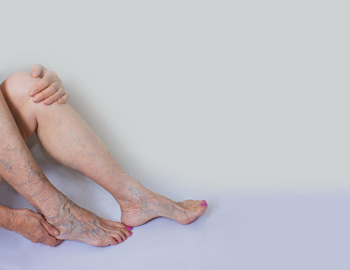 A common reason why tingling and loss of sensation may occur in the feet may be due to peripheral neuropathy. Additional symptoms that patients can notice may be instability in balance, muscle weakness in the feet, or possibly a burning feeling in the surrounding areas of the feet. Research has shown that diabetes plays a significant role as to why this type of neuropathy may be experienced, and is often the result of nerve damage caused by elevated blood sugar levels. There may be other causes of peripheral neuropathy, including viral infections, nerve damage incurred by an injury, or possible side effects from specific medications that may be ingested. Preventative measures for this ailment may include adopting lifestyle changes that may combine limiting the use of alcohol and tobacco. If you are have diabetes, it’s suggested that you seek the counsel of a podiatrist who can properly diagnose your symptoms and begin an effective course of treatment.
A common reason why tingling and loss of sensation may occur in the feet may be due to peripheral neuropathy. Additional symptoms that patients can notice may be instability in balance, muscle weakness in the feet, or possibly a burning feeling in the surrounding areas of the feet. Research has shown that diabetes plays a significant role as to why this type of neuropathy may be experienced, and is often the result of nerve damage caused by elevated blood sugar levels. There may be other causes of peripheral neuropathy, including viral infections, nerve damage incurred by an injury, or possible side effects from specific medications that may be ingested. Preventative measures for this ailment may include adopting lifestyle changes that may combine limiting the use of alcohol and tobacco. If you are have diabetes, it’s suggested that you seek the counsel of a podiatrist who can properly diagnose your symptoms and begin an effective course of treatment.
Neuropathy
Neuropathy can be a potentially serious condition, especially if it is left undiagnosed. If you have any concerns that you may be experiencing nerve loss in your feet, consult with Dr. Kenneth Donovan from Advanced Care Foot and Ankle. Our doctor will assess your condition and provide you with quality foot and ankle treatment for neuropathy.
What Is Neuropathy?
Neuropathy is a condition that leads to damage to the nerves in the body. Peripheral neuropathy, or neuropathy that affects your peripheral nervous system, usually occurs in the feet. Neuropathy can be triggered by a number of different causes. Such causes include diabetes, infections, cancers, disorders, and toxic substances.
Symptoms of Neuropathy Include:
- Numbness
- Sensation loss
- Prickling and tingling sensations
- Throbbing, freezing, burning pains
- Muscle weakness
Those with diabetes are at serious risk due to being unable to feel an ulcer on their feet. Diabetics usually also suffer from poor blood circulation. This can lead to the wound not healing, infections occurring, and the limb may have to be amputated.
Treatment
To treat neuropathy in the foot, podiatrists will first diagnose the cause of the neuropathy. Figuring out the underlying cause of the neuropathy will allow the podiatrist to prescribe the best treatment, whether it be caused by diabetes, toxic substance exposure, infection, etc. If the nerve has not died, then it’s possible that sensation may be able to return to the foot.
Pain medication may be issued for pain. Electrical nerve stimulation can be used to stimulate nerves. If the neuropathy is caused from pressure on the nerves, then surgery may be necessary.
If you have any questions, please feel free to contact one of our offices located in Warren, Livingston, and Toms River, NJ . We offer the newest diagnostic and treatment technologies for all your foot care needs.
Different Types Of Corns
If you have ever experienced a corn on your toe, you are most likely familiar with the pain and discomfort this may typically cause. It may appear as a small hardened bump on the top of the toes, which is referred to as a hard corn. It is generally the result of increased friction the feet and toes endure, and this may originate from wearing shoes and socks that are too tight. Additionally, another type of corn that is known as a soft corn is most often found in between the toes. This occurs when excessive sweat collects around the toes, and the center of the corn may become soft. Corns are known to be a painful ailment, and consulting with a podiatrist who can properly treat this condition may be beneficial in relieving the pain and discomfort that is associated with it.
If you have any concerns regarding your feet and ankles, contact Dr. Kenneth Donovan of Advanced Care Foot and Ankle. Our doctor will treat your foot and ankle needs.
Corns: What Are They? and How Do You Get Rid of Them?
Corns can be described as areas of the skin that have thickened to the point of becoming painful or irritating. They are often layers and layers of the skin that have become dry and rough, and are normally smaller than calluses.
Ways to Prevent Corns
There are many ways to get rid of painful corns such as wearing:
- Well-fitting socks
- Comfortable shoes that are not tight around your foot
- Shoes that offer support
Treating Corns
Treatment of corns involves removing the dead skin that has built up in the specific area of the foot. Consult with Our doctor to determine the best treatment option for your case of corns.
If you have any questions please feel free to contact one of our offices located in Warren, Livingston, and Toms River, NJ . We offer the newest diagnostic and treatment technologies for all your foot and ankle needs.
Symptoms of Morton’s Neuroma
If you experience pain and discomfort between the third and fourth toes, you may have a condition that is referred to as Morton’s neuroma. The pain originates from tissue that has been affected as a result of a swollen nerve on the bottom of the foot. Research has shown that being involved in specific sports or wearing high heels may play a significant role in the development of this uncomfortable condition. Patients often notice a burning sensation in the ball of the foot. This may intensify as weight is put on the foot, in addition to a numbness or tingling feeling. Relief may be obtained by wearing correct footwear or gently massaging the affected area. If you feel you may have Morton’s neuroma, it’s advised to seek the counsel of a podiatrist who can properly inform you of correct treatment techniques.
Morton’s neuroma is a very uncomfortable condition to live with. If you think you have Morton’s neuroma, contact Dr. Kenneth Donovan of Advanced Care Foot and Ankle. Our doctor will attend to all of your foot care needs and answer any of your related questions.
Morton’s Neuroma
Morton's neuroma is a painful foot condition that commonly affects the areas between the second and third or third and fourth toe, although other areas of the foot are also susceptible. Morton’s neuroma is caused by an inflamed nerve in the foot that is being squeezed and aggravated by surrounding bones.
What Increases the Chances of Having Morton’s Neuroma?
- Ill-fitting high heels or shoes that add pressure to the toe or foot
- Jogging, running or any sport that involves constant impact to the foot
- Flat feet, bunions, and any other foot deformities
Morton’s neuroma is a very treatable condition. Orthotics and shoe inserts can often be used to alleviate the pain on the forefront of the feet. In more severe cases, corticosteroids can also be prescribed. In order to figure out the best treatment for your neuroma, it’s recommended to seek the care of a podiatrist who can diagnose your condition and provide different treatment options.
If you have any questions, please feel free to contact one of our offices located in Warren, Livingston, and Toms River, NJ . We offer the newest diagnostic and treatment technologies for all your foot care needs.
Symptoms of Morton’s Neuroma
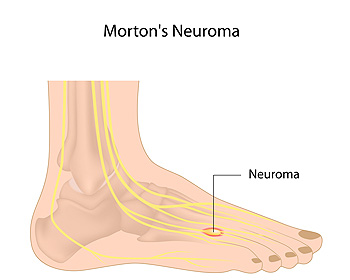 If you experience pain and discomfort between the third and fourth toes, you may have a condition that is referred to as Morton’s neuroma. The pain originates from tissue that has been affected as a result of a swollen nerve on the bottom of the foot. Research has shown that being involved in specific sports or wearing high heels may play a significant role in the development of this uncomfortable condition. Patients often notice a burning sensation in the ball of the foot. This may intensify as weight is put on the foot, in addition to a numbness or tingling feeling. Relief may be obtained by wearing correct footwear or gently massaging the affected area. If you feel you may have Morton’s neuroma, it’s advised to seek the counsel of a podiatrist who can properly inform you of correct treatment techniques.
If you experience pain and discomfort between the third and fourth toes, you may have a condition that is referred to as Morton’s neuroma. The pain originates from tissue that has been affected as a result of a swollen nerve on the bottom of the foot. Research has shown that being involved in specific sports or wearing high heels may play a significant role in the development of this uncomfortable condition. Patients often notice a burning sensation in the ball of the foot. This may intensify as weight is put on the foot, in addition to a numbness or tingling feeling. Relief may be obtained by wearing correct footwear or gently massaging the affected area. If you feel you may have Morton’s neuroma, it’s advised to seek the counsel of a podiatrist who can properly inform you of correct treatment techniques.
Morton’s neuroma is a very uncomfortable condition to live with. If you think you have Morton’s neuroma, contact Dr. Kenneth Donovan of Advanced Care Foot and Ankle. Our doctor will attend to all of your foot care needs and answer any of your related questions.
Morton’s Neuroma
Morton's neuroma is a painful foot condition that commonly affects the areas between the second and third or third and fourth toe, although other areas of the foot are also susceptible. Morton’s neuroma is caused by an inflamed nerve in the foot that is being squeezed and aggravated by surrounding bones.
What Increases the Chances of Having Morton’s Neuroma?
- Ill-fitting high heels or shoes that add pressure to the toe or foot
- Jogging, running or any sport that involves constant impact to the foot
- Flat feet, bunions, and any other foot deformities
Morton’s neuroma is a very treatable condition. Orthotics and shoe inserts can often be used to alleviate the pain on the forefront of the feet. In more severe cases, corticosteroids can also be prescribed. In order to figure out the best treatment for your neuroma, it’s recommended to seek the care of a podiatrist who can diagnose your condition and provide different treatment options.
If you have any questions, please feel free to contact one of our offices located in Warren, Livingston, and Toms River, NJ . We offer the newest diagnostic and treatment technologies for all your foot care needs.
Different Types of Foot Surgery
There are several reasons why it may be necessary to have foot surgery performed. These may include having a foot deformity corrected, relieving severe pain and discomfort, or to have normal function returned to your foot or ankle. A common surgery that involves having the toenail removed may be a suitable cure for specific foot conditions such as ingrown toenails. Additionally, for people who suffer from the constant pain of an ankle disorder, a procedure that is known as open ankle fusion surgery may be a viable option to obtain moderate or full relief. Bunion surgery may be necessary for the permanent removal of painful bunions if all other options should fail. If you are contemplating foot surgery, it’s advised to speak with a podiatrist who can properly inform you of any information you need to know, so a proper decision can be reached.
Foot surgery is sometimes necessary to treat a foot ailment. To learn more, contact Dr. Kenneth Donovan of Advanced Care Foot and Ankle. Our doctor will assist you with all of your foot and ankle needs.
When Is Surgery Necessary?
Foot and ankle surgery is generally reserved for cases in which less invasive, conservative procedures have failed to alleviate the problem. Some of the cases in which surgery may be necessary include:
- Removing foot deformities like bunions and bone spurs
- Severe arthritis that has caused bone issues
- Cosmetic reconstruction
What Types of Surgery Are There?
The type of surgery you receive will depend on the nature of the problem you have. Some of the possible surgeries include:
- Bunionectomy for painful bunions
- Surgical fusion for realignment of bones
- Neuropathy decompression surgery to treat nerve damage
Benefits of Surgery
Although surgery is usually a last resort, it can provide more complete pain relief compared to non-surgical methods and may allow you to finally resume full activity.
Surgical techniques have also become increasingly sophisticated. Techniques like endoscopic surgery allow for smaller incisions and faster recovery times.
If you have any questions please feel free to contact one of our offices located in Warren, Livingston, and Toms River, NJ. We offer the newest diagnostic and treatment technologies for all your foot and ankle needs.
Why do Stress Fractures Develop?
If you enjoy the sport of running or jogging, you may develop a stress fracture. This may gradually occur from the frequent repetitive motion that accompanies this type of activity. Despite the fact that many people who engage in sports may endure the discomfort of a stress fracture, certain individuals may be prone to developing this ailment. This may include having a medical condition that may weaken the bones, or experiencing a disorder that may affect the nerves. This may result in a loss of feeling. The pain that is associated with this condition may not be felt. The noticeable symptoms may include pain and discomfort and may be more intense in one foot. After an MRI or bone scan is performed, the proper treatment options can be discussed, such as possibly wearing a cast or boot or taking certain medications. Please consult with a podiatrist if you have endured a stress fracture and would like information about correct treatment techniques that are right for you.
Stress fractures occur when there is a tiny crack within a bone. To learn more, contact Dr. Kenneth Donovan from Advanced Care Foot and Ankle. Our doctor can provide the care you need to keep you pain free and on your feet.
How Are They Caused?
Stress fractures are the result of repetitive force being placed on the bone. Since the lower leg and feet often carry most of the body’s weight, stress fractures are likely to occur in these areas. If you rush into a new exercise, you are more likely to develop a stress fracture since you are starting too much, too soon.
Pain resulting from stress fractures may go unnoticed at first, however it may start to worsen over time.
Risk Factors
- Gender – They are more commonly found in women compared to men.
- Foot Problems – People with unusual arches in their feet are more likely to develop stress fractures.
- Certain Sports – Dancers, gymnasts, tennis players, runners, and basketball players are more likely to develop stress fractures.
- Lack of Nutrients – A lack of vitamin D and calcium may weaken the bones and make you more prone to stress fractures
- Weak Bones – Osteoporosis can weaken the bones therefore resulting in stress fractures
Stress fractures do not always heal properly, so it is important that you seek help from a podiatrist if you suspect you may have one. Ignoring your stress fracture may cause it to worsen, and you may develop chronic pain as well as additional fractures.
If you have any questions, please feel free to contact one of our offices located in Warren, Livingston, and Toms River, NJ. We offer the newest diagnostic and treatment technologies for all your foot care needs.




